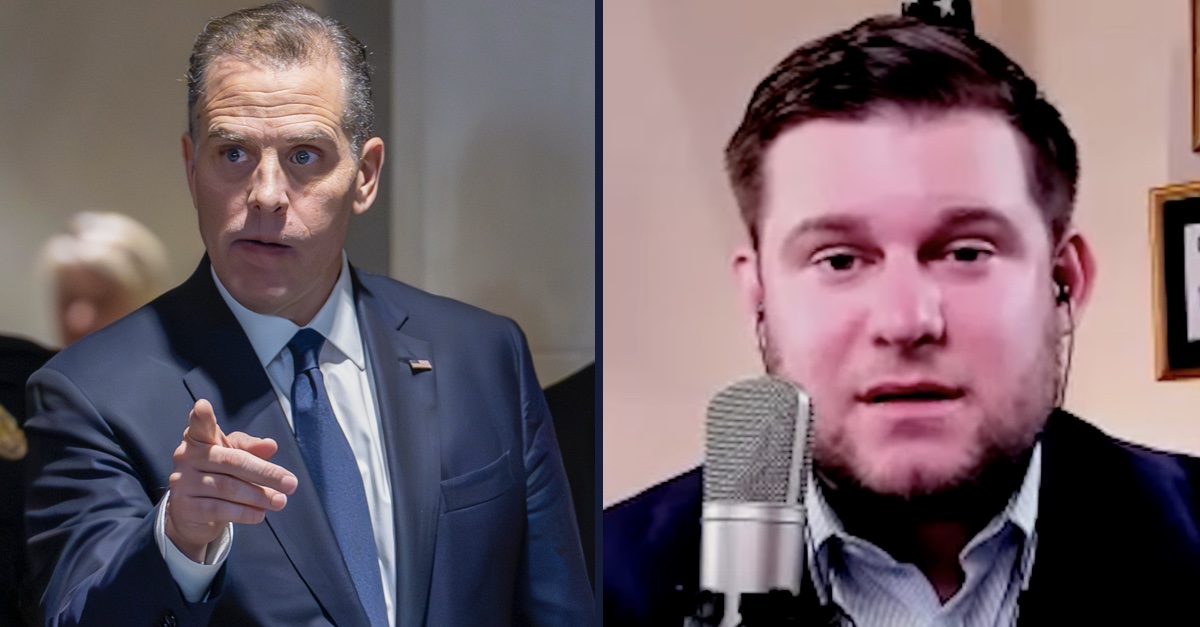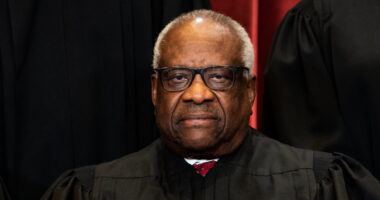
Left: Hunter Biden (AP Photo/J. Scott Applewhite). Right: Garrett Ziegler talks Hunter Biden on YouTube (YouTube/Reporter.London).
Hunter Biden, fresh off a series of legal losses, could soon find himself on the hook for someone else’s legal bills.
Recently, a federal judge made a decision on a case brought forth by Biden under the Computer Fraud and Abuse Act (CFAA), where the lawsuit was ultimately dismissed with prejudice.
Now, the defendant in that matter, Garrett Ziegler, a former aide in the first Trump White House, is pushing for $93,000 in attorneys fees.
In September 2023, the onetime presidential son sued Ziegler and his nonprofit research firm, ICU LLC, which does business as Marco Polo.
This legal action revolved around the ongoing dispute concerning Biden’s laptop, which made headlines after being left at a repair shop in Delaware and later handed over to authorities. Some of the data from the laptop was leaked to individuals critical of the Democratic Party.
The defendants in this case were accused of unlawfully accessing, altering, and damaging computer data that they did not own. They were alleged to have obtained this data by hacking into Biden’s iPhone and examining a copy of the hard drive from what they believed to be his laptop.
In December 2023, Ziegler, who previously worked as a policy analyst under then-Trump trade adviser Peter Navarro in the Office of Trade and Manufacturing Policy, moved to have Biden’s lawsuit dismissed.
“Plaintiff filed this action in retaliation against Defendants for publishing information, media, and emails originating from the files of the infamous ‘Biden Laptop,”” the motion reads. “The shop owner turned the Biden Laptop over to the FBI on or around October 2019 after discovering disturbing material. Soon after, media outlets gained access to emails and documents found on the Biden Laptop, resulting in a media storm of allegations against Hunter Biden and President Biden regarding potential foreign compromise.”
But the dismissal was a long time coming.
For over a year, the former presidential son pursued the case.
In March 2024, Biden accused Ziegler of making relevant admissions. Days later, Ziegler moved to have the judge in charge of the case, who donated to Joe Biden’s 2020 presidential campaign, recused. The younger Biden, in turn, opposed the recusal bid – which ultimately failed. After that, Hunter Biden demanded attorneys fees from Ziegler – over an ill-fated motion to dismiss the case. Ziegler pushed back but U.S. District Judge Hernán D. Vera sided with the plaintiff over the “frivolous” motion to dismiss the federal lawsuit as a Strategic Lawsuit Against Public Participation (SLAPP) under California law.
Golden State laws not withstanding, or availing, Southern California weather allegedly resulted in a substantial change of fortunes.
On March 5, Hunter Biden filed an ex parte motion to voluntarily dismiss the case against Ziegler “without oral argument” and without prejudice – meaning the lawsuit could be refiled in the future.
“Plaintiff does not have the resources to continue to litigate this matter,” the motion reads. “Plaintiff has suffered a significant downturn in his income and has significant debt in the millions of dollars range. Moreover, this lack of resources has been exacerbated after the fires in the Pacific Palisades in early January upended Plaintiff’s life by rendering his rental house unlivable for an extended period of time and, like many others in that situation, Plaintiff has had difficulty in finding a new permanent place to live as well as finding it difficult to earn a living. So, Plaintiff must focus his time and resources dealing with his relocation, the damage he has incurred due to the fires, and paying for his family’s living expenses as opposed to this litigation.”
On March 13, Vera granted the motion – with prejudice.
“Defendants argue that they will suffer legal prejudice should the Court grant a dismissal without prejudice,” the court observes. “Specifically, they contend that because they have already exchanged their summary judgment brief with Plaintiff, and because the scheduled deposition of Plaintiff was imminent, dismissal without prejudice would give Plaintiff an unfair advantage. The Court agrees.”
The judge’s order explains his reasoning, at length:
[T]he Court concludes that Defendants would in fact suffer legal prejudice if the voluntary dismissal were granted as requested by Plaintiff (i.e., with the ability to refile). The parties have both expended significant resources in litigating the initial motion to dismiss, including a subsequent request for attorney’s fees filed by Plaintiff. More importantly, the Court notes that Defendants have already prepared a motion for summary judgment and exchanged this document with Plaintiff’s counsel, as required by the Court’s Standing Order. This motion effectively gives Plaintiff a roadmap to Defendants’ most important legal arguments, and provides a prejudicial advantage given that Plaintiff has not yet had to file an opposition. If allowed to refile this same case in the future, Plaintiff could develop new facts, contact new witnesses, explore and include additional claims, and thereby gain a strategic advantage in opposing the factual and legal defenses presented in Defendants’ motion. That is more than inconvenience or additional expense—it represents real legal prejudice to Defendants in defending refiled litigation. On this record, the Court cannot find that Plaintiff acted diligently in requesting voluntary dismissal prior to the exchange of Defendants’ summary judgment brief.
In addition, the Court considers the fact that Plaintiff is seeking voluntary dismissal without prejudice on the eve of Plaintiff’s deposition, which was scheduled for March 10, 2025. Again, allowing Plaintiff to dismiss without prejudice would give him additional time to prepare for deposition with the information gleaned from Defendants’ recent briefing. Discovery-related considerations like these are proper grounds to find legal prejudice.
On March 27, Ziegler moved for attorneys fees.
The 27-page filing seeking those reimbursements explains that Ziegler’s request is relatively limited.
“Defendants reasonably seek fees and costs not for the entire litigation but rather the portion of the litigation that could have been avoided by seeking dismissal at an earlier time or in a more reasonable manner: preparing for depositions that were ultimately missed, responding to the ex parte application, and drafting and serving the motion for summary judgment,” the motion reads. “Given the deadlines set forth in the Scheduling Order, Defendant’s counsel had to move quickly and dedicate significant time to these tasks.”
To hear Ziegler’s counsel tell it, Hunter Biden “had an opportunity to avoid any further fees or costs by offering to dismiss the case” in early 2025 “which would have obviated” unnecessary travel and legal expenses – but, for some reason, chose not to do so.
The filing goes on to complain that the manner in which Hunter Biden chose to file his dismissal further ramped up Ziegler’s legal bills because “Biden did so not by noticed motion” but, rather, “in a manner that required Defendant’s counsel to drop everything and respond to the filing within twenty-four hours or risk losing important legal rights for her clients (including a dismissal without prejudice).”
Ziegler’s motion also takes Hunter Biden to task for how things ended – in lieu of the plaintiff being “widely reported as publicly disputing that the data and computer at issue in this case was even his” and the concomitant allegations against the defendants.
“Due to Plaintiff’s obstruction and abrupt dismissal of the case, Defendants never had an opportunity to reach post-discovery briefing to vindicate their position,” the attorneys fees motion goes on. “After approximately eighteen months of litigation, and – more importantly – after Defendants noticed depositions of Mr. Biden and third-party witness P. Kevin Morris, and after Marco Polo served its opening brief on a Motion for Summary Judgment, Mr. Biden suddenly moved ex parte to voluntarily dismiss the case without prejudice citing financial difficulties exacerbated by the Palisades Fire.”
Love true crime? Sign up for our newsletter, The Law&Crime Docket, to get the latest real-life crime stories delivered right to your inbox.











